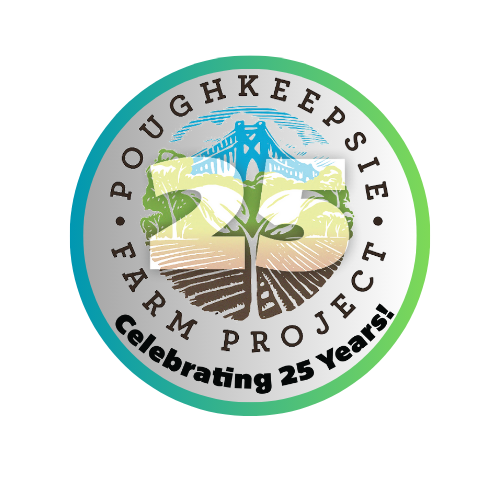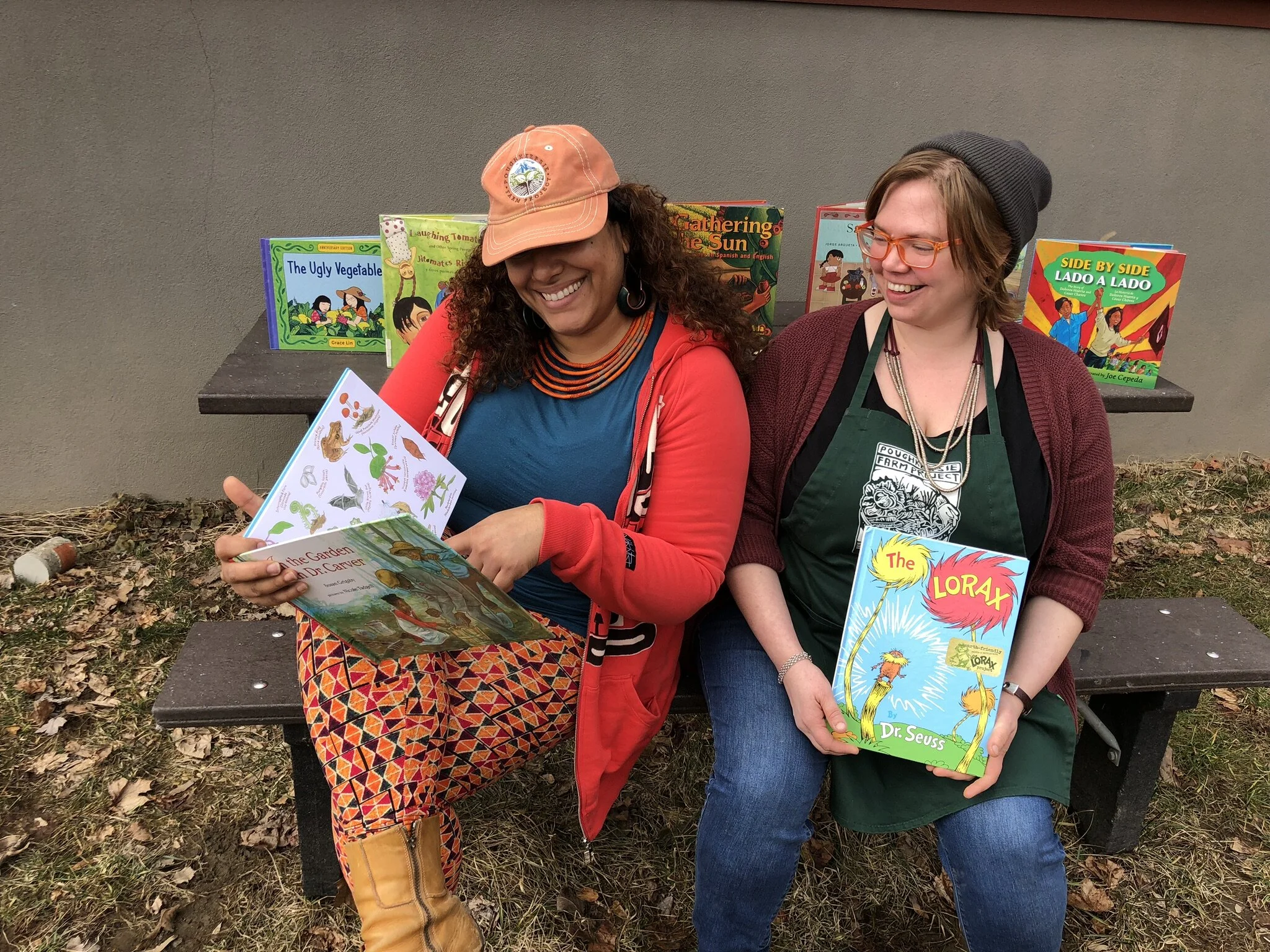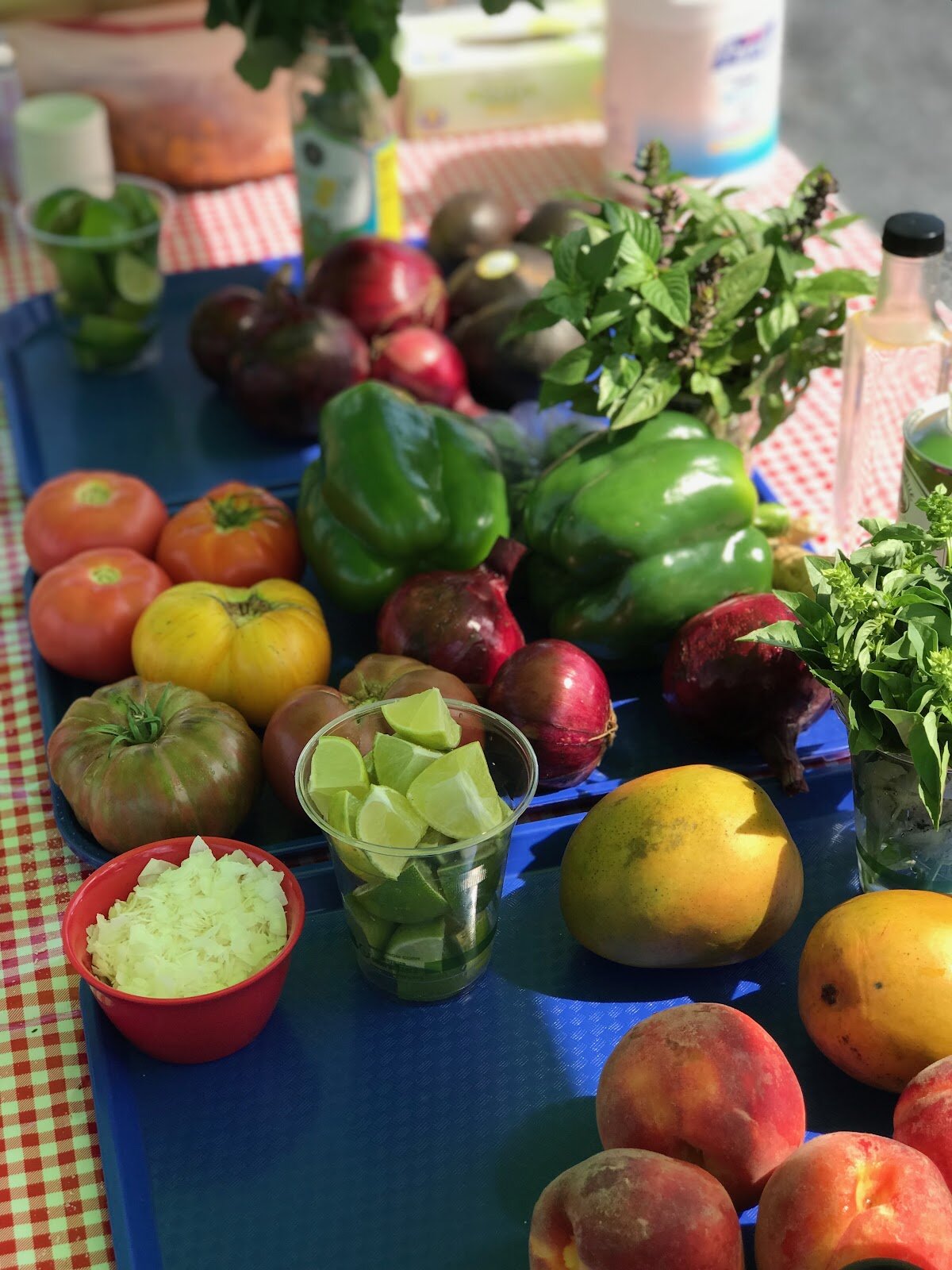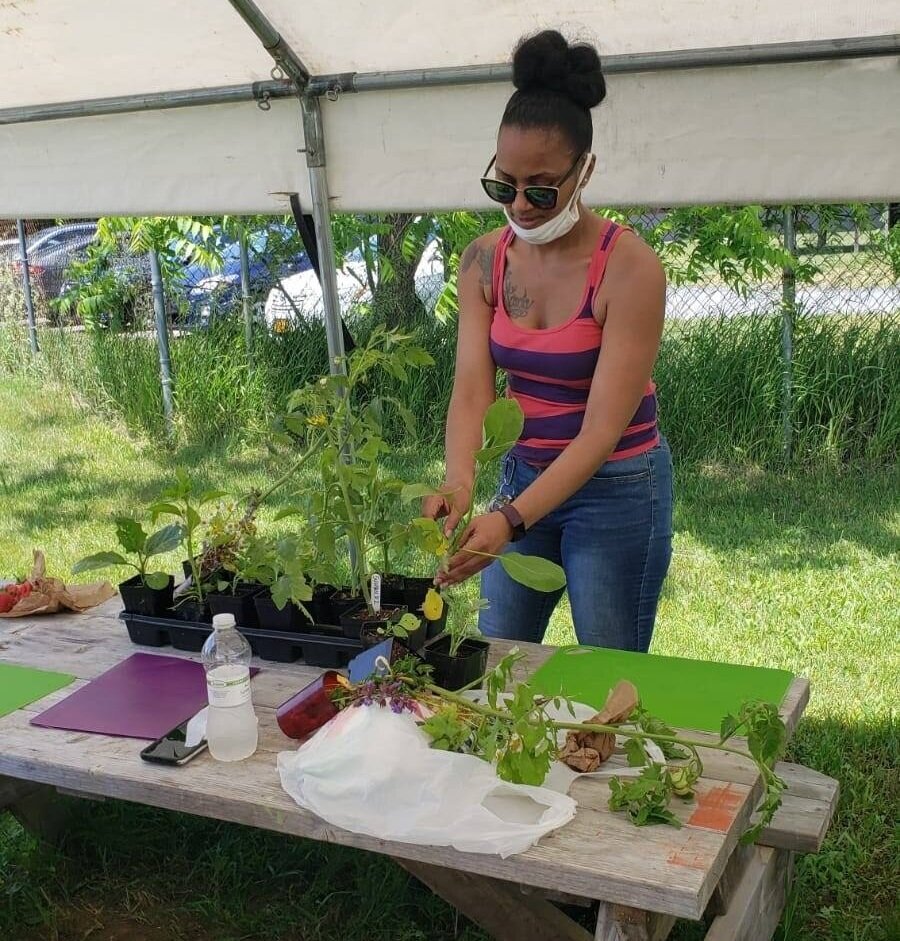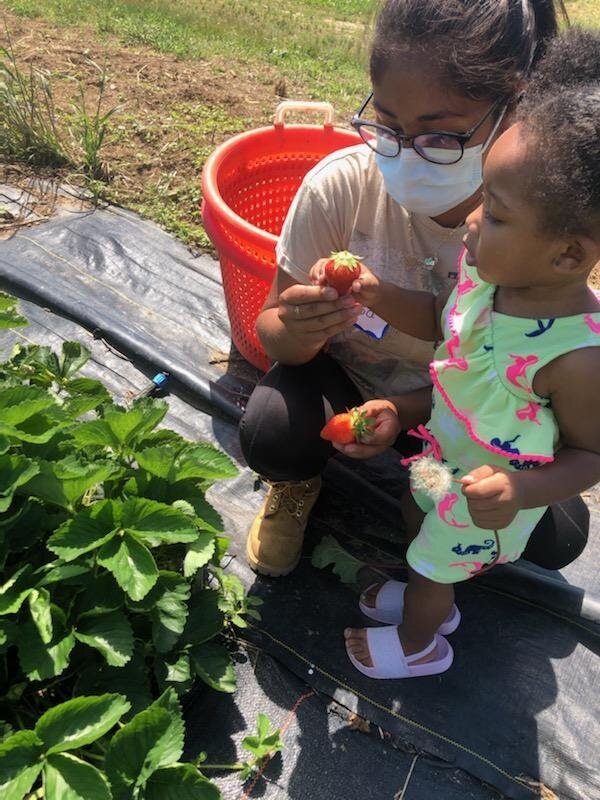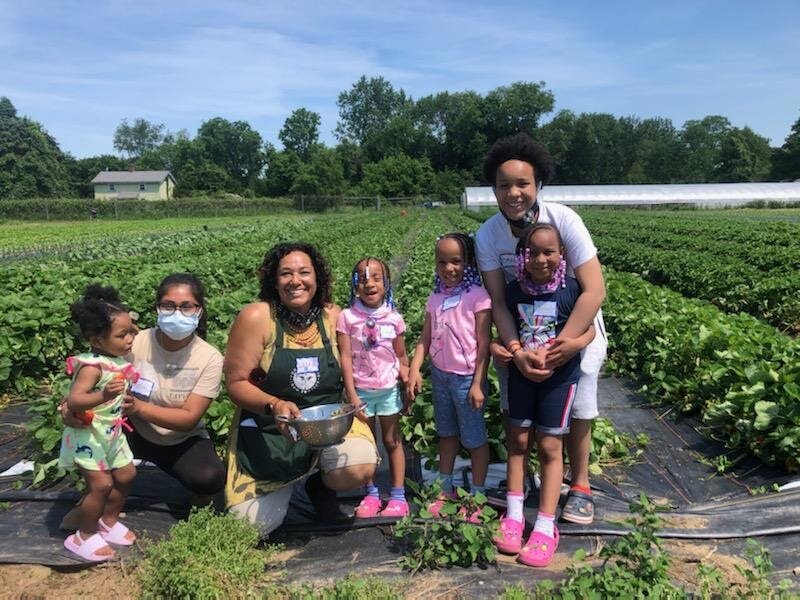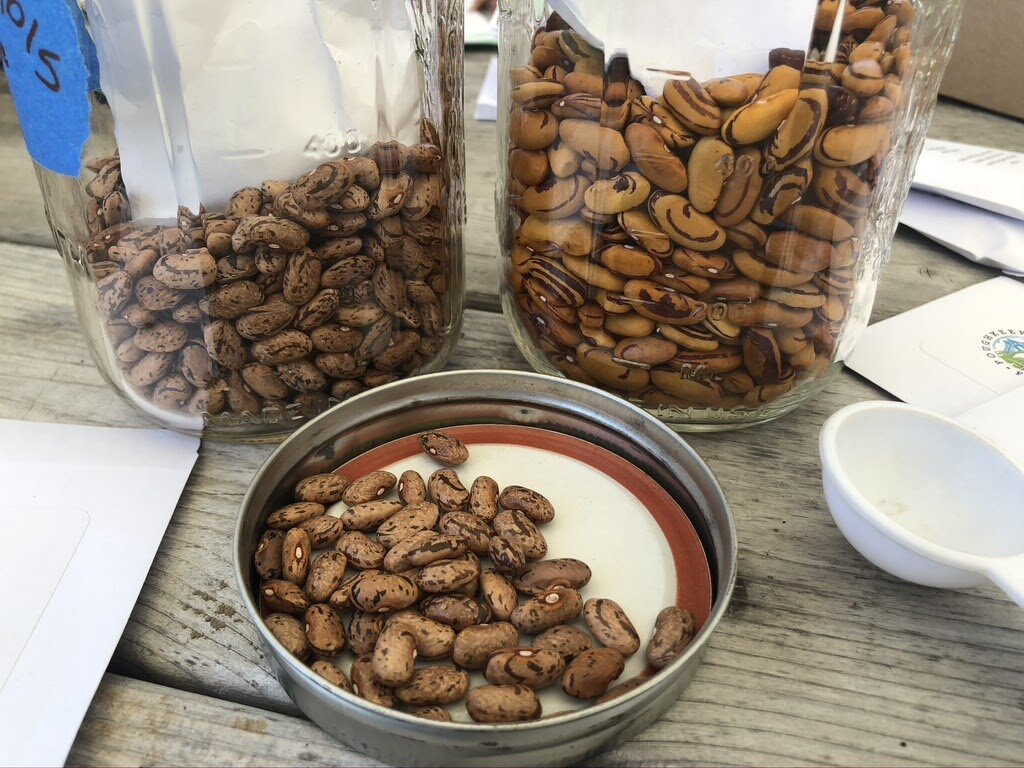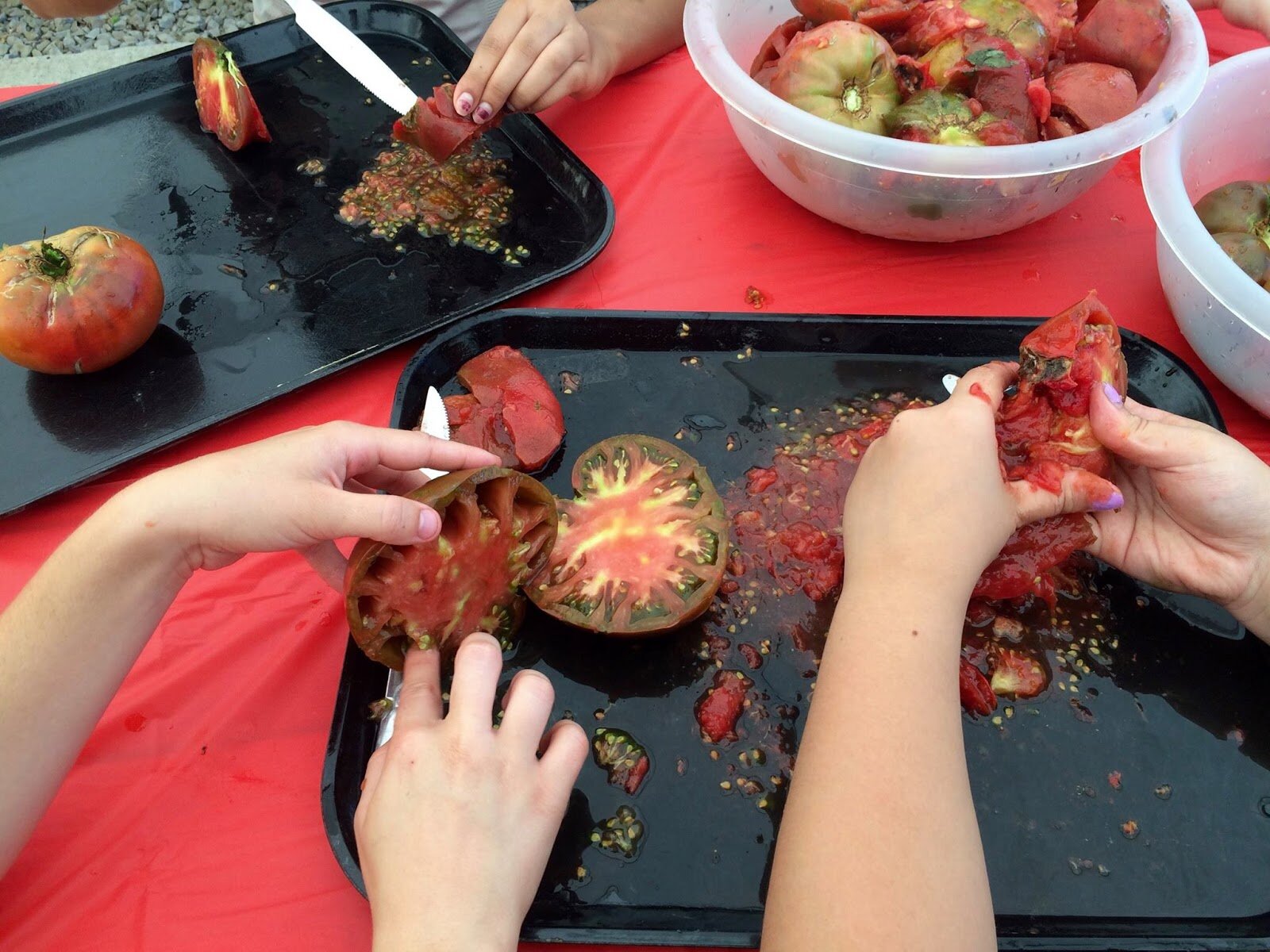Zeus Brewing Company and Poughkeepsie Farm Project are partnering for something special this harvest season! Our P.F.L., aka, Poughkeepsie Farm Lager, is now available for pre-sales through the Poughkeepsie Farm Project farm store to support our annual Soup-A-Bowl fundraiser.
This limited edition beer is a first for the farm. Pat Lang, The Farm Project's farmer, worked in tandem with Zeus' Brewer, Amit Ram, to create an easy-drinking lager that highlights the bounty of fall. Made with Poughkeepsie Farm Project's butternut squash, sweet potatoes and honey, Ram made it a point to source malted barley, rye and hops all grown and processed in the Hudson Valley, making it a 100% Hudson Valley Beer and a perfect complement to comfort foods and family feasts alike.
“This was the perfect opportunity to work with another local City of Poughkeepsie business as it allows us to deepen our connection with our community while amplifying the breadth of opportunity in the Queen City”, Poughkeepsie Farm Project’s Executive Director, Madeline Henriquez says. “We are delighted to have the support of Zeus this year and look forward to working with our many local partner organizations and businesses to carry out our important work.”
Zeus Brewing Co. Owner, Jeremy Phillips, was excited to partner with the farm when the opportunity arose, “We thought working with PFP would be such a cool project. It’s not often that you can source ingredients to make a beer right from your backyard so to speak. We can’t wait to taste the beer and look forward to a great event on the 17th!”
P.F.L. is a light 4.3% ABV lager that Ram says, “is an expression of local agriculture and the community which it originates from joined together in balance and harmony. The result is a smooth crisp harvest lager designed to ease you into the fall season.”
Flavor notes of airy fresh baked biscuits with a subtle honeydew note in the background make P.F.L. a beer that won’t last long. Pre-sales are now open and run through October 10th on our farm store with a special price of $20 for a 4-pack of 16oz cans. Pick up will be at the Soup-A-Bowl, October 17th, from 12-4PM at the The Environmental Cooperative Barn at 50 Vassar Farm Ln, Poughkeepsie, NY 12603. No Soup-A-Bowl ticket purchase is needed to buy the beer, but with exciting raffle prizes, handmade pottery and delicious soups available, it’s hard not to!
Proceeds from P.F.L. beer sales and all sales made at the Soup-A-Bowl go directly back to the farm’s charitable giving and education programs, including our Farm to School initiative, community education and food share donations for food insecure neighbors. Locally-made beer that tastes good and does good? Now that’s something we can all toast to.
To grab your own 4-pack of P.F.L., visit our farm store.
What does language justice have to do with me as a White English-speaking educator in a multilingual community?
As we get back to normal and return to the familiar routines of a new school year, let’s be mindful of the uneven toll the past 18 months has taken on our communities, especially in regards to access to education. We have all been impacted by the past year and a half of lockdowns, we have all experienced losses large and small and bear the emotional toll of a time spent in fear and isolation. Yes - AND - imagine how those losses and challenges are multiplied in communities facing food aparatheid, lacking access to internet and technology to connect to remote learning, where families are forced to make the impossible choice between going to jobs as essential workers OR missing paychecks to care for and educate their children. And imagine the even greater challenge faced by families who do not speak and read English as their primary language.
A major narrative in American culture is that education is a great equalizer that affords all young people the same opportunities to succeed and “pull themselves up by their bootstraps” as the saying goes. And over the past 18 months we have been forced to confront and question that myth as we’ve watched the socio-economic divides in our country widen and seen the disproportionate effect the pandemic has had on BIPOC communities, schools, and families. As we return to school and get “back to normal”, please consider that normal isn’t the ideal we should be holding ourselves to - we can do better than normal. Perhaps we can imagine and help manifest an educational system that truly centers equity and inclusion for ALL students. Our organization has realized we need to do more to make our programs and resources accessible to Spanish speaking families, and we acknowledge that we should have been engaging in language justice work long before now.
This is the work we ALL must do. As a White English-speaking educator, I recognize that I cannot sit back passively as my BIPOC and multilingual colleagues work to make our systems more inclusive and equitable. So I’ve been asking myself what can I do from my position of power and privilege to elevate this work? I can express gratitude for the often overlooked labor of translation and interpretation. I can brush up on my conversational Spanish skills. I can create a word-rich learning environment that includes spoken and written language in both English and Spanish. I can uplift the voices of my colleagues on the forefront of language justice work. I can be mindful of asking a bilingual coworker to join me if I know an event or program will be attended by Spanish speaking families. I can encourage bilingual youth to see their language skills as an asset and not a burden. I can say a few sentences in not-so-great Spanish when meeting multilingual youth and families to show that I’m making an effort and releasing my perfectionist tendency to always want to get it exactly right.
If you have Spanish-speaking and multilingual families and youth in your lives, I encourage you to do what you can to help them feel supported, resourced, and seen. If you have friends or colleagues who are engaging in language justice work, say thank you, let them know that their efforts are noticed and appreciated and are making a difference. And let them know that they aren’t alone in this fight, that you recognize we ALL have a responsibility for fostering more equity and resilience in our community.
Meet Nick & Tania: New energy to the Pershing Ave Park & Urban Farm
Tania Hernandez-Martinez , Assistant Garden Educator and Community Garden Steward
Tania Hernandez-Martinez , Assistant Garden Educator and Community Garden Steward
“I come from a very tight knit family from a town in Oaxaca. I am currently a student studying computer science at Marist College and farming on my days off. I knew what I wanted to study since high school, but I also loved being outdoors, so when I needed to complete a certain amount of community service hours for my English class, I chose to do it with PFP. Now, a couple of years later, I am a staff member at PFP. I grew up in Poughkeepsie and I don't come from a wealthy family, so I am more than aware of the current situation here, which only inspired me more to help make a change for the future generations. Thanks to PFP, I have been able to eat healthier food more often; I have been able to connect more with not only my family/family history but my neighbors through gardening; and I have connected with people who believe that everyone deserves to have equal opportunities and deserve to speak whatever language they feel most empowered speaking. Through my work at Pershing Ave., I hope to share everything I have learned with the parts of the community I have yet to meet and I hope that we can build our own tight knit family.”
Nick "Nico" Jackson
Nick "Nico" Jackson is a Hip Hop dancer from Poughkeepsie, NY. His style of dance is of his own creation, entitled ‘Water Style’, with a focus on body waves, gliding, popping and locking. He started dancing at 5 years old, to Michael Jackson, at family functions and local events. As a teenager, he formed his very own dance crew called 'Circus Freaks' and they performed together for 11 years. In 2015, they auditioned for ‘So You Think You Can Dance’. He graduated from Poughkeepsie High School class of 2012. From there, he began his personal journey of mastering his craft. Dancing is his life and he "can’t imagine where he would be without it." The reason why he teaches is to build confidence and encourage honest self expression in his students.
When Nico's not dancing, he's a chef, an avid gardener and he loves to travel. Nico started apprenticing with the ECP in June 2021 where he looks to master new skills in farming and community organizing. He plans to give back to his community through free fresh foods and Outreach events so that more stability can be created in his hometown and beyond. Providing a safe haven for people to Express, Learn and Grow with a specific focus on the Black community. This Fall, he will move to running a farm at Pershing Avenue Park in Poughkeepsie and work in collaboration with the Poughkeepsie Farm Project, Ecological Citizen's Project, Scenic Hudson and the surrounding community members.
Earlier in August, Nico started a few trays of seedlings. They include tatsoi cabbage, kale, romaine lettuce, summer lettuce, kohl rabi and spinach. He is planning to direct seed cilantro, parsley, and arugula. Stay tuned for more.
Seeding Language Justice at PFP
By Lala Montoya
Hola hola
Imagínate tratar de leer este artículo y no poder entender, escuchar algo y no poder participar.Ahora imagine leerlo en el lenguaje que tú entiendes, escuchar algo y poder participar
Imagine trying to read this article and not being able to understand, listening to something and not being able to participate. Now imagine reading it in the language you understand, listening to something and being able to participate.
How did it feel to read this and perhaps stumble into the confusion of finding a different language than expected? And then how liberating to find the translation below!
Wherever you might teach or learn, language is being used as a tool of communication, empowerment, liberation, or oppression. Language is one of the most powerful tools we can use and it is one of the first things we learn when very young. There is such joy in learning how to describe a taste, say what we like and what we are learning to like, explain what we agree with and what we think is unfair.
For those of you reading this, you might find yourself living in the dominance of English. Or perhaps you find yourself in a vibrant community like us here in Poughkeepsie, NY where - with 19% of the population being Hispanic or Latinx - you can walk down Main Street and you see areas where multilingual spaces are the norm; there are stores where one can walk in and feel transported to Latin America. And yet when we step into the banks and schools, things go back to that dominance of English. To some, that might not seem so bad but just imagine..
You are a young 16 year old who just moved to the United States from South America. Your mother came with you fleeing a civil war and wanting to be with family who had moved here years before. You go to sign up for school, you’re undocumented and neither one of you speaks English. You walk into the school and it takes some time to find someone who speaks broken Spanish, finally a sight of tranquility where a secretary is able to help you get everything in place. Now fast forward 4-5 years, you have learned English, but your mother hasn't, she can’t help you with school work and you know she cries about it in the quiet of the night. After a long day at school before you head to work, you have to interpret for her at the bank, with your landlord, or help with immigration papers. That’s what I experienced as a young person, here in a country where there is nothing written in the Constitution about English being the national language.
As educators, we have a powerful role in making this young person's experience - and the experiences of all the youth we engage with - into something so different! Imagine the young child walking into that school being welcomed by signs in different languages, a staff member accompanied by an interpreter who asks which is the language of preference! And this mother walks through the experience with understanding and without being judged. Four to five years later, that young person now has the tools of language justice because it’s talked about in schools and when they step into a bank or immigration office, translation and interpretation services are the norm! Both mother and daughter thrive and because culture shapes us and we also shape the culture, that mother and daughter can now be integral parts of their new community. They can become teachers, nurses, translators, and interpreters. They can be language justice workers in all their fields. -- Language Justice (as defined by Communities Creating Healthy Environments): “For us, language justice is about building and sustaining multilingual spaces in our organizations and social movements so that everyone’s voice can be heard both as an individual and as part of a diversity of communities and cultures. Valuing language justice means recognizing the social and political dimensions of language and language access, while working to dismantle language barriers, equalize power dynamics, and build strong communities for social and racial justice”
So that is the dream we are cultivating at Poughkeepsie Farm Project. Along with many beautiful organizations in the Hudson Valley and worldwide. We dream of supporting our community by having all that we offer at the farm available in Spanish and English. We began this process during the pandemic when our staff realized that many parents and families needed more Spanish-language support now that learning was taking place at home, widening the gap between the English-dominant schools and the homes where English is not the language of preference. To support everyone in our community, we hosted events like a read-aloud storytime with breakout groups in the 2 languages that are predominant in Poughkeepsie. We also started on the journey of translating all our learning materials into Spanish!! Last summer, we began hosting multilingual community harvest events at the farm where Spanish and English were both equally important and present. The support of the community was felt, English-speaking folks were now making an effort to speak Spanish! It was beautiful, at one event after folks heard a land acknowledgement and explanation of language justice in both Spanish and English the whole audience present clapped! That moment still brings tears to these eyes!
Picture of Lala M and Tania holding interpretation equipment. photo credit: Nora Evita Aresti
I want to share with you some of the basic things we can all do to begin engaging in the practice of language justice. We can have lesson materials and paperwork translated. We can have interpretation services available. We can create and foster multilingual spaces. Let's break down the terminology so we can all better understand and truly support our students and their families with a language justice framework.
Translation: Translation is a mental activity in which a meaning of given linguistic discourse is rendered from one language to another. It is the act of transferring the linguistic entities from one language in to their equivalents in to another language.
https://translationjournal.net/October-2017/definition-of-translation.html
This is a helpful tool and a starting point (not an end point!) for our schools and organizations.
Interpretation: The oral process of rendering a spoken message from one language into another. Interpretation is like taking translation to the next level and getting closer to a just space. But without translation and the proper outreach, we can host Spanish interpreted events and have no Spanish speakers attend.
https://nesfp.org/sites/default/files/resources/language_justice_toolkit.pdf
Multilingual Space (as defined by Alice Johnson): “Combining bi-directional simultaneous interpreting with comprehensive document translation and multilingual facilitation, in order to integrate cross-race efforts in (multiple languages), shifting power away from traditionally dominant cultural norms…and intentionally using language to collectively build political analysis and cross-race allies among grassroots leaders.” Multilingual spaces are how I dream our farms, schools, and all organizations to be!
Language Justice (as described in the Multilingual Strategies for Community Organizing): “Language justice is rooted in a history of resistance by communities and peoples whose voices and cultures have been suppressed for generations. Language justice is an alternative to that historical pattern of disenfranchisement and oppression. It affirms the fundamental rights of individuals and communities to language, culture, self expression, and equal participation.”
Language Justice (as described in Soul Fire Farm's Language Justice Guide): “We see Language Justice as a framework that transcends language access, and we uplift the languages that go beyond speech - the ones that are signed as well as the languages of the roots, the soils, the rains, the lands, and our more-than-human relatives. We understand that we filter these languages through our identities and privileges, including class, race, ethnicity, education, literacy, documented status, gender, sexuality, and physical and cognitive abilities. Holistic accessibility rooted in the struggle for justice is not merely about access - it is about participation, reflection, visibility, equity, shared leadership, radical acceptance, and love. Understanding each other is part of the foundation to loving each other. “
What a powerful tool for us as educators to incorporate language justice into our work. Now I leave you with a quote from the song Awakening by Climbing Poetree:
https://www.climbingpoetree.com/video/bioneers-2014/
Hold a mirror to your heart? What does it reflect?
What will be the message of the legacy we left?
We were born for a reason,
we can be whatever we give ourselves permission to be.
interpreting team
At PFP we are giving ourselves permission to learn, to acknowledge that we should have been delivering content in Spanish long ago. To also be realistic about our current capacity and start where we can. And continue to grow in sustainable, radical and magical ways. So what are you giving yourself permission to try? Where do you see the journey of language justice and access beginning for you?
And just before you go to reflect on what we discovered, I will share some of the beautiful and rich content we've been creating. I invite you to learn a little Spanish with us, or to plant a little container garden with us and uplift the language of plants as well. And learn to prepare some of our favorite summer recipes.
And please if you know folks who can learn with us in spanish share our youtube channel with many videos in spanish
And I remind you, “Hold a mirror to your heart? What does it reflect? What will be the message of the legacy we left? We were born for a reason, we can be whatever we give ourselves permission to be.” Give yourself permission as an educator starting today to welcome Language justice into the spaces you hold. “Holistic accessibility rooted in the struggle for justice is not merely about access - it is about participation, reflection, visibility, equity, shared leadership, radical acceptance, and love.” Soul Fire Farm Language Justice Guide
Understanding each other is part of the foundation to loving each other. Let's radically accept each other and nurture communities rooted in love so that we can all thrive and grow!
Herbs Change Everything! Growing Culturally Rich Plants in PK Gardens
Tania (left) and SonyaJoy led a cooking class at Pershing Avenue Gardens Saturday, August 14th featuring three globally sourced, locally grown herbs: papalo, Besobela (Ethiopian holy basil), and Akoko Mesa basil.
When we think of food justice, access and affordability are often centered. Cultural relevance is also an important part of the mix! The foods that are connected to our memories, hearts and worldview are the often those we are confident to identify, cook, and enjoy fresh. Maybe like me, you grew up eating certain vegetables and remember your grandmother’s hands washing them under sparkling water. Maybe seeds of these plants have been passed down in your family, a loving forethought of a bright future. When we include who we are and where our people come from, we can get a fuller picture of what food justice looks, tastes and smells like. We can grow vegetables and herbs from all over the world in our region, transforming global foods into local treasures. As a country of immigrants, we can savor the flavors of home.
Trapped indoors due to COVID and cold weather, winter provided a great time to do research. Over these months, PFP Green Jobs young adult interns did diligent research, narrowing down a broad search for herbs and vegetables that include palates from Africa, Central and South America and Asia. Two online resources stood out among the rest. True Love Seeds’ online seed catalogue has in-depth descriptions of the cultural roots of each plant that provides much connection to source than the average seed packet. The University of Vermont’s Center for Sustainable Agriculture’s “Global Food, Local Food: Guide to Growing, Harvesting and Preserving African & Asian Crops in the Northeast” is a wealth of information on plants like African Eggplant (also called White Garden Egg) and Bitter Melon.
A few highlights from our research included a range of herbs. Herbs are the heavyweights of the kitchen in my opinion. Thai basil can take a curry from flat to herbaceous and citrusy. A dose of chimichurri, a sauce made of vinegar, chili and green herbs, will brighten any meat, fish or vegan protein immediately. Below are 2 of my personal favorites. Akoko Mesa Basil from Ghana is an earthy, minty basil variety. The name means “Chicken Dance” since this herb can make chicken, and many other foods, really sing! We sourced our Akoko Mesa Basil seeds from Baker Creek Heirloom Seeds. Papalo originated in South America, and is often eaten as a fresh finishing herb typically kept on the table and tear onto your food right before you dig in. If you like cilantro, you might adore papalo! It’s similar, but even more bold. As a gardener, it’s a tremendous gift since papalo grows all summer long - it’s not prone to bolt in the heat. Terroir Seeds and Johnny’s Selected Seeds both carry papalo, unfortunately it doesn’t grow wild in our region as it does in the southwest.
Akoko Mesa Basil from Ghana, featured on Baker Creek Heirloom Seeds' Rare Seeds website.
Papalo, a summer heat-loving alternative to cilantro.
Thanks to the dedication of PFP educators, especially Kathryn Brignac, Farm to School Manager and our co-conspirator Greenhouse Manager, André Luiz de Oliveira Domingues, we were able to start a selection of seeds this spring. With some diligent effort and lots of watering, seedlings were able to make it into the ground in the PFP Seed Saving Garden as well as some of the new, PFP-supported gardens which are only in their first or second seasons including Pershing Avenue, Rip Van Winkle Apartments, and Hudson Garden Apartments / Boys and Girls Club Community Gardens.
Besobela Ethiopian Basil from True Love Seeds, currently grows in the PFP Seed Saving Gardens.
Now that we have several varieties of herbs, as well as Aji Dulce Peppers, African Eggplant, and Mitsuba (Japanese Parsley) growing in PFP and community gardens, we can get cooking! Saturday, August 14th Tania Hernandez-Martinez, Assistant Garden Educator and Community Garden Steward, and I led a cooking workshop to trial some of these new herb varieties. With Helana Mazurek, Scenic Hudson SCA Intern/Event and Community Project Assistant, and community members we prepared Summer Squash Tacos with Papalo Guacamole, Akoko Mesa Basil Peach Mango Salad, and Timatim (Ethiopian Tomato Salad) with Besobela Basil. Our cooking classes are COVID-safe, everyone wears masks and prepares their own tasting without sharing food. These same recipes will be featured at our upcoming Adult Gardener Workshops on Saturday September 18th. Registration coming soon for Poughkeepsie residents. Please email gardens[at]farmproject[dot]org for details.
Ingredients for cooking workshop included ripe summer tomatoes, crispy peppers, and juicy peaches from PFP and local farms with 2 varieties of African basil.
We miss you out here! Volunteering on the farm
The PFP of 2 years ago, at least in appearance, looks a bit different from the PFP of today, for the significant reason of a global pandemic and a restructuring of the CSA! One functional result for all of us has been no more work share program and fewer CSA members working with us on harvest, weeding, and more. We have heard from some of you that the program is missed, and we understand! We also miss seeing your many faces joining us on the farm for work, rain or shine, throughout the season.
German with part of the 2021 garlic
Fortunately, for those missing the important connection to the food and work of PFP from lending a hand through work share, the opportunity to work still exists! The work share program allowed CSA members to access a lower CSA share price in return for a number of labor hours on the farm during the season. By transitioning to a new tiered, sliding scale model for CSA, shares are available to all at a variety of prices. In this model we trust everyone to make the pricing choice that is appropriate for their situation, but we avoid the requirement to work, meaning the multiple pricing options are not linked directly to physical ability.
Garrett & Rachel harvesting carrots
What does this mean for folks missing work share shifts? You are still VERY welcome to spend some hours helping to grow, care for, harvest, and process plants and food alongside the farm team! This year, we have approached volunteer support differently from how it was done in the past, offering volunteer orientations in which we share about PFP as an organization and lay out the various volunteer opportunities that exist here.
A volunteer shift on the farm will look very much like a work share shift! We still count on the support of our community to bring in huge harvests of nourishing Poughkeepsie-grown vegetables and to care for the land by weeding, as well as managing tarps, row cover, and mulch materials. Volunteers have helped in a major way in 2021, weeding our new raspberry and rhubarb plantings, weeding potatoes and sweet potatoes, weeding onions, garlic, and leeks, and harvesting loads of garlic. There are upcoming opportunities to provide labor support with garlic cleaning/sorting, onion harvest, all sorts of weeding, potato harvest, carrot harvest, high tunnel bed preparation, and clearing mulch materials from harvested beds to make way for fall cover crop!
Volunteer group from CIA weeding onions
Are you someone who would like to be notified of opportunities to lend a hand on the farm when it is most needed? Simply head to our volunteer page at https://www.farmproject.org/volunteer , select ‘Register’, and fill out the short form. Farm support shifts will generally occur at least once a week, and to accommodate different schedules they will occur on mornings, afternoons, weekdays, and Saturdays. Registering as an interested volunteer is also a great way to hear about other support opportunities at PFP, including guided work caring for the Meditation and Discovery Gardens and stewarding Poughkeepsie school garden sites with the PFP Education team.
PFP farm field walk
We sincerely look forward to working alongside new and familiar faces in the coming months as we bring in abundant fall harvests, soak up the sun (or rain), and prepare for the winter farm season! See you soon.
-Pat
Sharing is Caring... Or is it?
In June, zucchini is exciting. It's tender, and small. It's a sign of summer, and one that signals the approach of tomatoes, melons, peppers and eggplant. But by August, zucchini's charm has worn off. Anyone who has ever grown zucchini knows how much zucchini a healthy plant can produce... and how big they get if you miss one.
By the end of summer, zucchini is everywhere. And no one wants to see another baseball-bat-sized zucchini.
And yet, it keeps on coming.
What to do with all the zucchini? You've grilled it and stuffed it. You've made zucchini bread, of course -- with AND without chocolate. Because this isn't your first rodeo. You've made ratatouille, zucchini chips, lasagna and cold soup. You've made zoodles and googootz and fritters.
You're out of recipes, and out of ideas. There's only one thing left: Sneak some zucchini onto your neighbor's porch.
Luckily for you, there is a day for this.
This year, National Sneak Zucchini onto your Neighbor's Porch Day falls on Saturday, August 7. It's a great opportunity to share the bounty with your unsuspecting neighbors -- just make sure to avoid any "No Trespassing" signs and pointy-toothed pets. To show that you come in peace, we highly recommend accompanying your squash deposit with your favorite recipe... maybe even a "Happy Zucchini Day!" note.
And if, by some stroke of good fortune, you find yourself on the receiving end of National Sneak Zucchini onto your Neighbor's Porch Day... well, count your lucky stars, and steel yourself for another batch of zoodles.
Reflections on Food Power Adult Gardener Workshops
By: Chris Gavin and Larissa Alvarado
This season, the PFP education team is launching a new program called Food Power Adult Gardener workshops. This initiative is geared towards supporting and connecting gardeners and wisdom keepers in the City of Poughkeepsie, creating space for folks to come together to learn, share knowledge, and build community around growing, cooking, and eating healthy food. Workshops are being offered for families who have participated in our after school and distance learning programs. Larissa (Lala) Alvarado is an educator, herbalist, and garden steward here at PFP, and she shares her reflections on the successes and highlights of the first workshop held in early June. The conversation is facilitated by her colleague and co-teacher Chris Gavin.
[Chris] Take me through the plan for this first workshop.
[Larissa] This workshop series is intensive. It's a full day, a lot of hours and many different things to experience and explore. It’s an herbal workshop, it’s a gardening workshop, it’s a healthy cooking workshop - all rolled into one big day. We did a farm tour, we made pesto and spring rolls, we did hands-on garden work and skill-building, we picked strawberries, we made herbal tea. And everyone walked out of here with the food we made together, seedlings and soil to grow their own plants, bouquet of flowers from the herbal walk, plants to make herbal tea, a ton of strawberries - it was really the full bounty of what the farm has to offer. People who sign up are getting a great experience but it’s also a big commitment, they are giving up a full day of their weekend so they have to really want to be here and be a part of what we are doing.
A variety of seedlings to grow at home were available to new and experienced gardeners.
[Chris] Tell me about how the team centered inclusivity and accessibility in the planning process.
[Larissa] We made sure that this program was as inclusive as possible. We provided transportation if anyone needed it. We provided lunch and took into consideration the dietary needs of all of the participants. We had an interpretation for Spanish speakers. And the biggest thing is that we provided a children's program doing similar activities but geared towards kids. If you have young humans, that makes it problematic for folks to attend a program like this, and we provided a safe and supportive learning setting for kids AND parents. The kids were learning alongside them but not WITH them, so the adults were able to fully participate and enjoy being in the space. I am a single mom from here in PK, my kids are grown now but as a young mom I totally would have signed up for this program because of how much support was built into it.
Learning about how local strawberries grow...and taste!
[Chris] Who participated in this first workshop?
[Larissa] This program was open to anyone who is a city of Poughkeepsie resident interested in coming together to learn and share what they know about gardening. But the incredible thing was that all the families that signed up had participated in our programs before, our Food Power @ Home distance learning program or our after school programs. So they all came in with a baseline of knowledge and a shared sense of community. None of the families knew each other but it felt like they were instantly close friends. They came in with their curiosity and a real desire to connect with each other and the values of PFP. And the kids didn’t know each other but they supported and looked out for each other like they were family, the older kids taking care of the young ones. And it happened to be that all the participants are moms from Poughkeepsie, and they are all women of color, which also created a special bond and a sense of they all have been through similar experiences. Everyone was sharing mom stories of courage and persevering through issues of raising a family, and also sharing the joys of being a mom.
[Chris] From your perspective, what are your hopes for this new project?
[Larissa] For me, I want PFP to be a place that feels welcoming and inclusive to everyone in my community. I want folks to see PFP as their own space to come and learn and give back to others. I want people from our community to get to be a part of each other's learning and growth, and they have an opportunity to share their own wisdom with others. This workshop was the first of a FIRST! It was incredible to watch it grow from a kernel of an idea and then we really co-creating the experience together WITH the folks participating. This is such a big step for us to get connected with community members who have knowledge and expertise and could be trained to be leaders and educators with PFP and in their community. It’s all about fostering community-based leadership.
Lunchtime featured farm fresh arugula, pesto pasta, and refreshing herbal iced tea.
[Chris] There must’ve been a lot of incredible moments and stories that came out of this workshop. Can you share a few with me?
[Larissa] One mom told me she gave up her regular “me time” to come to this workshop, she usually spends four hours getting her nails done and relaxing. And here we were with our hands in the soil, and somehow being on the land with dirty hands became her “me time”, this was a new way for her to take care of herself and nurture herself. Also, I knew this was a really good day for all the moms when they asked if they could come back and do this every Saturday! And I laughed and said that’s a hard no - it’s a lot of work putting this together! But you know what, I can see these women coming together on their own and hosting their own workshops, they can do this themselves without us now, they just needed a way to connect!
[Chris] I know you had a special connection with one of the moms who reminded you of yourself when you first came to PFP. Tell me about how you saw yourself reflected in her.
[Larissa] One mom came in with a background in herbalism and she came in saying, “I want to work for you, I want to work WITH you, I see myself as a part of this.” She said this is exactly what she wants to be doing - self care, caring for the earth, caring for the community. It is such a big deal for a young Black mother to say she can see herself being a part of what we are doing. It reminded me of myself when I first connected with PFP. I didn’t know what this was, I was just filling in for my sister for a family cooking workshop hosted by PFP at one of the schools in Poughkeepsie. After we did this amazing hands-on workshop we also got all the tools and ingredients to make the recipe at home. And I kept thinking - what is this place? I really get to be a part of this? I’m getting all this stuff to take home? I need to know what's going on with this crew and find out how do I become a part of this. The abundance, the knowledge, the support, the generosity of what PFP offers is so great. I saw the same look on this mom’s face - like not believing the gift she had just stepped into. Sharing my story of how I started at PFP and how I am a mom from Poughkeepsie like her made her feel like she could be a part of what we are doing. Because here I am now in a capacity to teach what I’ve learned, share with other moms about how to grow food, eat healthy, be in community and share their knowledge with each other. She asked how she can stay involved, I told her just keep coming, keep showing up, keep gaining confidence so you can be in a leadership role one day.
[Chris] As an educator, what was your favorite teaching moment?
[Larissa] I love showing people herbs for the first time in person, in real life. We’ve all had chamomile tea, but imagine getting to meet camomile as a growing flower, not just dry tea in a bag. Someone says, you mean this is growing right here right now and I can take this home and make it into tea myself? There is a real gift in learning to do something yourself, making it with your own hands. It’s about building the skills but also building the confidence to believe in yourself. You can do this.
Larissa, PFP intern Rosa, and kids of the Adult Workshop participants making summer memories.
[Chris] Thank you so much for sharing these stories and insights with me and the rest of the PFP community.
[Larissa] Of course! It’s all about the love!
Queering Farming
LGBTQIA staff and allies at Poughkeepsie Farm Project!
Queer and Trans farmers are on the emergent edge of farming. We are leaning into restorative and sustainable practices, shifting narratives toward collective ownership and leading in food justice work. When we step on to the land alongside straight, cisgendered folks, we have barriers of understanding to aerate, not just soil.
This past January, I helped facilitate an online gathering for queer farmers at the Northeast Organic Farming Association's Annual Conference with Jamie Levato, Education Director of Poughkeepsie Farm Project and Maggie Cheney of Rock Steady Farm and Flowers in Millerton, NY. In a small breakout group, folks from across our region showed up in vulnerable conversation. We shared about surviving multiple levels of social isolation during COVID; navigating deep waters of complexity as we work and live with friends and significant others; and leaning in to queer ecology as a resource for whole-systems farming. These magnificent, thoughtful humans reminded me why I think being queer is a superpower that unleashes empathy on the world.
Empathy in farming looks like us!
Chris Bolden-Newsome at Sankofa Community Farm in Philly, centering African Diasporic crops and culture for Black American and West African residents
Naima Penniman of Soul Fire Farm, transforming injustice in the food system through relational, healing community centering Black, Indigenous and Latinx leaders
Maggie Cheney and D Rooney of Rock Steady Farm and Flowers in Millerton, NY who feed LGBTQ folx through a partnership with the Callen-Lorde Community Health Center
Pat Lang and Jamie Levato at Poughkeepsie Farm Project inspire staff, members and neighbors to collaborate together in building a resilient and just food system
K Greene of Hudson Valley Seed Company is all about deep commitment to local seed security and preservation of crop diversity
Owen Taylor, part of the dynamic team that shares the love of seeds, rich in their cultural stories and close to the hearts of people we can name, at True Love Seeds
Jayne Henson of Transgenerational Farm holds a vision for re-imagining rural land as a safe haven for queer and trans people
Take heart! Get out there and march, protest, party, and celebrate the beauty of our community. Take time to focus on who has been silenced, dismissed and alienated. Unearth and untangle where homophobia and transphobia pervading popular culture exists inside of you. Step into the possibility that joy arises from cherishing diversity and celebrating what is real.
Show a queer farmer some love this summer!
SonyaJoy Key
Seeds Will Reunite Us: A call to rekindle your relationship with seeds
by Aviva Magder-Pascaris, Education Intern Spring 2021
We too often think of our favorite animal when we think of extinction. I want you to picture that animal, and in its place imagine the seed for your favorite crop. Small yet mighty, seeds are indeed living things. They might spend a great deal of their lifetime in a small, dry, and hard shelled form, but once awoken, they provide incredible things for the world around them.
Seeds are the beginning and end of a plant's life cycle. They are the sustenance that nurtures the first leaf in a plant's life. They are food for all living things, human and nonhuman, and are even resilient in times of environmental disturbance. Despite this, many crop varieties are on the verge of extinction.
During my last week with the Poughkeepsie Farm project I got to package seeds for distribution. Pictured here are the Doe Hill pepper seed variety grown in 2016
When I started at Poughkeepsie Farm Project as an Education Intern, I did not expect to enter into an intense obsession with seeds. Seed varieties, seed saving techniques, seed histories, and seed sovereignty. To think that I was planting seeds not understanding their complexity seems impossible knowing what I know now.
Threats to Seed Diversity
So why are many varieties on the verge of extinction? As I began my research into the world of seeds, there was a narrative that stood out to me the most.
The United States has so vastly changed the agricultural landscape in the last 100 years. Small family farms have been wiped out by big destructive industry, land has been bought and sold by corporations that profit off of water, air, and the labor or people, and seed varieties have been bought up by agrochemical corporations; there are three private companies who own nearly 53% of the seed market.
Communities no longer control seeds, land, and water. Saving and protecting seeds isn’t just about making sure there is food on your plate, although this is an invaluable benefit. It is about resistance, and most importantly, the resilience and diversity of a food system for all peoples.
As we have seen in this last year, a resilient and just food system is necessary now more than ever before. And seeds, being the first link in the food system, are a great place to start.
Seed Saving: You, Me & PFP
Seed saving is not just for farmers, but for families, communities and individuals too. Here are some things I’ve learned about seed saving that I would like to share with you all. Actions I hope to carry into my work as an environmental educator, and that Poughkeepsie Farm Project and its community are taking part in.
Save, Plant, and Protect Diversity
Seed savers work to protect traditional, heirloom, and culturally significant crop varieties. Crop varieties refer to the specific types of a given crop such as the Midnight Black Turtle and the Tiger Eye beans or Amish Paste and Paul Robeson tomatoes. Maintaining a wide range of varieties of each crop means preserving a diversity of colors, flavors, textures, patterns, shapes, and sizes within our food system. Working together to protect diversity of food is foundational for community food sovereignty.
Here at Poughkeepsie Farm Project, the Seeds of the Food System program works to grow and save many varieties of seeds. Examples include the Paul Robeson Tomato, an heirloom variety named after a famous African-American opera singer and civil rights activist, northern-adapted Pigeon Peas, or “Gandules" in Spanish and "Gungo peas" in Jamaica, and the Aji Dulce Pepper a mild variety from the Carribean.
A variety of seeds saved here at the Poughkeepsie Farm Project
Preserve Cultural Heritage
Many organizations and communities save seed as a way to protect their cultural heritage, preserve the ancient practices of seed keepers, and develop multi-generational resistance to the current food economy that marginalizes BIPOC (Black, Indigenous, People Of Color) communities.
Poughkeepsie Farm Project works to support educational development and food distribution for the Poughkeepsie community through locally selling and donating seeds to individuals, families, nonprofits and schools. They also work to support the growth of seeds in libraries, such as the Newburgh Seed Library through donating saved seed.
Dragon Tongue & Tiger Eye bean varieties saved here at the Poughkeepsie Farm Project
Teach, and Learn!
It is so important to share what you know with your family and friends and keep learnings. Try saving seeds from vegetables and fruits you buy at the grocery store, or those you like to grow in your home or garden. Engage in learning about the seeds from your region, and the indigenous communities of the land. Beyond that, work to support BIPOC seed keepers, farmers, and food networks - resources linked below!
Poughkeepsie Farm Project’s education staff work with youth interns to grow plants for seed, and teach stewardship on the land. They offer free community workshops on how to engage with seed saving work, and as an organization they aspire to share and collaborate over botanical and agricultural knowledge with all residents of Poughkeepsie.
PFP interns saving tomato seeds
Resources for Continued Learning
Some of the seeds I plant and save in my parents home garden. Hudson Valley Seed Co’s organic, open-pollinated, heirloom variety seeds!
To learn more check out the resources I helped to develop below, which provide more information on starting seeds and saving seeds.
Seed Starting 101
Seed Saving Resource Packet
Check out another blog I wrote titled Seeding a Revolution: Sovereignty and Connection in the Food System
Look out for future programming on seed saving at the farm project by visiting their Seeds of the Food System page! To connect with the PFP seed project, contact seeds@farmproject.org.
Books
Ashworth, Suzanne, Seed to Seed: Seed Saving and Growing Techniques for Vegetable Gardeners
Rogers, Marc, Saving Seeds: The Gardener’s Guide to Growing and Storing Vegetable and Flower Seeds
Deppe, Carol, Breed Your Own Vegetable Varieties
Connolly, Brian, The Wisdom of Plant Heritage: Organic Seed Production and Saving
White, Rowen: Breeding Organic Vegetables: A Step-by-Step Guide for Growers
Somos Semilla and Sustainable Harvest International, Semillas Para Todos - Spanish Seed Saving Manual
Online
Seed Savers Exchange Learn & How-to Guides
Reclaim Seed NYC Resources in Spanish and English
Ira Wallace on Seed Saving and Saving Seeds from Flowers and Herbs
Soul Fire Farm, Liberation on Land Video Series - Seed Keeping
Grassroots Seed Network, BIPOC Resources & Videos
Caroline Farm Stewards, Seed Saving Toolbox
Saving Our Seeds Resources
Seed Save
Organic Seed Alliance
Southern Exposure Seed Exchange, Seed Growers Blog
NAFSA: Indigenous Seed Keepers Network
Seed Saving Charts
English
Southern Exposure Seed Exchange, Seed Saving Instruction Handout
Seed Savers Exchange, Seed Saving Guide
Spanish
Southern Exposure Seed Exchange, Como Guardar Semillas Para Uso Casero
French
Seed Savers Exchange, Tableau de Sauvegarde Des Semences
